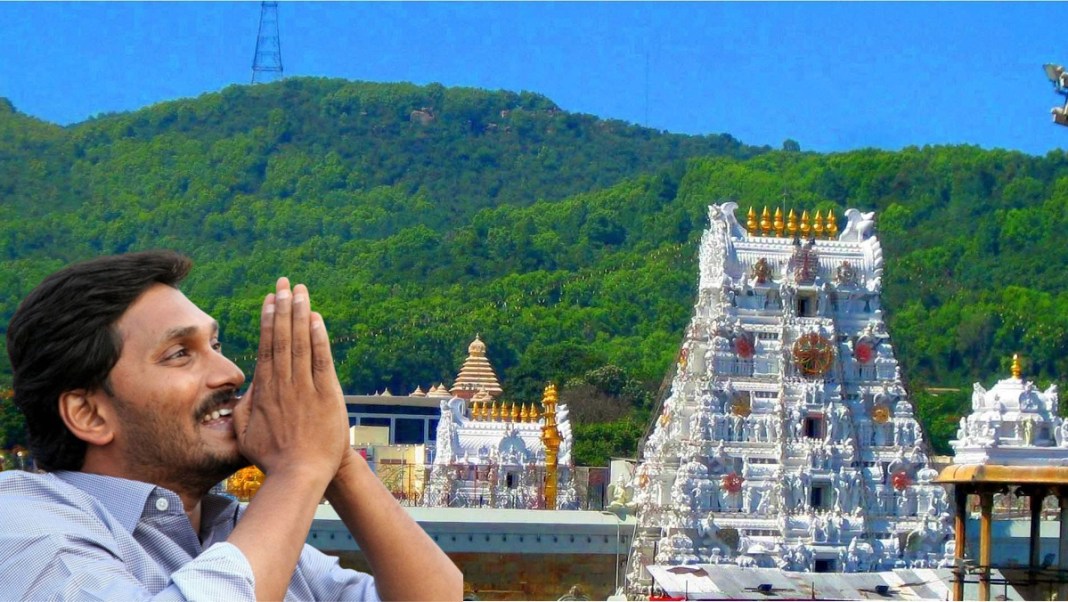Tirupati’s world-famous Lord Venkateswara (Balaji) temple’s net worth of over Rs 2.5 lakh crore (about $30 billion) is more than the market capitalisation of IT services firm Wipro, food and beverage company Nestle and state-owned oil giants ONGC and IOC,” news agency Press Trust of India (PTI) reported today, a story that was instantly picked by several mainstream media houses. Following Tirumala Tirupati Devasthanams’ (TTD) first declaration since its establishment in 1933, the news agency relayed the information that the temple’s assets include 10.25 tonnes of gold deposits in banks, 2.5 tonnes of gold jewellery, about Rs 16,000 crore of deposits in banks, and 960 properties across India. All these total to over Rs 2.5 lakh crore.
At the current trading price, the net worth of Tirupati temple is more than several blue-chip Indian firms and even a few multinational companies, the PTI said, comparing the amount to Wipro’s market cap of Rs 2.14 lakh crore (as of Friday), UltraTech Cement’s Rs 1.99 lakh crore and Nestle’s Rs 1.96 lakh crore. The PTI compared the Tirupati money also with that of PSUs Oil and Natural Gas Corporation, Indian Oil Corporation, NTPC Ltd and Coal India Ltd and automobile makers Mahindra and Mahindra and Tata Motors, mining conglomerate Vedanta, real estate firm DLF and several others, saying that the temple was richer than all of them.
How Tirupati money is spent
What the media suppressed is the information about how the Andhra Pradesh government-controlled TTD, the keeper of the temple dedicated to Tirupati’s presiding deity, Venkateswara, a form of Vishnu, spends this money. It is spent largely on secular projects and sometimes also on purposes of such religions, the followers of which are hostile to Hindus and Hinduism.
Last year in November, the Andhra Pradesh government was reported to be constructing an elevated expressway corridor to link Tirupati with other parts to make transport hassle-free apparently for pilgrims. If the estimated cost of the infrastructure was about Rs 684 crore, the TTD was contributing Rs 458 crore out of it. If this is spending Hindu money on a Hindu purpose, there’s more.
The Jaganmohan Reddy-led YSRCP government had earlier amended the Andhra Pradesh Endowments Act to raise the contribution of the TTD to the state government’s Common Good Fund, increasing it manifold from Rs 2.5 crore to Rs 50 crore.
The TTD claimed to have lost Rs 400 crore in revenue during the pandemic-necessitated lockdown and said that it did not have money to pay employees’ salaries. The YSRCP government-controlled body thus justified the sale of 50 properties later.
Two years ago, the TTD had put the Tirupati temple funds into the Andhra Pradesh government’s securities. In 2020 again, the finance wing of TTD proposed keeping the temple management body’s money in union government securities to draw a nearly 7% rate of interest as against the 5.5% interest that nationalised banks offered at that point.
Observers believed that the TTD included the clause to allow the deposit of these funds in union and state government securities to let the Reddy regime use the funds of Lord Balaji. Worse, if the Christian chief minister-led government were not to pay the interest and refuse to return the deposit, the TTD would not have a redress mechanism as the TTD was controlled by the Andhra Pradesh government.
On 28 August 2020, the TTD Board surreptitiously passed a resolution allowing its funds to flow into the Andhra Pradesh government’s treasury.
Raising suspicion further was the fact that TTD chairman YV Subba Reddy was an uncle of Chief Minister Jaganmohan Reddy. In December of that year, several TTD deposits matured in different banks, which the Andhra Pradesh government was eyeing for its securities all along, critics alleged.
Of course, Subba Reddy denied it. His office said, “The Trust Board has explored various options of investment, in the backdrop of the falling interest rate scenario in the wake of the Covid pandemic and considered investments in Central government or in different state government securities as one of the options to be considered. There is no ‘hidden agenda’ in this as the Trust Board has transparently made the decision in the Trust Board meetings telecast ‘live’ and further this agenda with a Board resolution was also uploaded on (the) TTD website. The investments in Central government or state government securities are not newly brought out by the Board but such a provision already exists in Sec 111(3) of Endowments Act 30 of 1987 and in Rule 80 of the TTD Rules issued in G.O.311, dt.09.04.1990 and such investments in securities can be made only after the guidelines are approved by the government. No investment was made till now either in the Central government or in different state government securities. Board wanted to examine the investment option in securities in the wake of falling interest rates. Now, this option may not be required to be acted upon, as the interest rates are going up, in the light of buoyance in the economy in the wake of unlock (sic) guidelines 5.0 and the TTD may continue to invest in the fixed deposits in banks.”
But the problem predates the Jagan government
Things were hardly better before a Christian chief minister stepped in. When the state was ruled by the Telugu Desam Party, Ramanjaneyulu, the state secretary of Hindu Dharma Raksha Samanvaya Samithi, Andhra Pradesh, had urged the regime of the time not to use the money donated by Hindus to the Tirupati treasury on non-Hindu purposes.
On 16 January 2015, Ramanjaneyulu delivered a speech at the national Hindu convention at Ramnathi, Ponda, saying, “The government has taken over only Hindu temples. Even the funds offered in Hindu temples are being used for the people of other religions.”
“Donations to the extent of Rs 3,000 crore are collected in Tirupati temple every year. Of this amount, 13.5% — that is Rs 400 crore — is credited to the Common Civil Fund of the government to spend for other purposes, including on people of other religions. Of this amount, financial assistance is given even for the Haj pilgrimage,” the Hindu activist said.
“Although 10% (Rs 300 crore), has been earmarked for the propagation of Hindu Dharma, only Rs 3 crore is spent on Hindu dharma,” he said. “We will have to start fighting against such activities,” said Ramanjaneyulu, who demanded that the Tirupati temple area be declared a Hindu region.
TTD’s finances
The board of TTD has the mandate to maintain the temple of Lord Balaji of Tirumala and temples related to the sect’s faith. It reports to the Government of Andhra Pradesh. While it also provides services to pilgrims to Tirumala and Tirupati — like bus services, food and accommodation, queue management, head tonsuring distribution of prasada etc — with the chairman of TTD and members appointed by the state government, the board carries out the state government’s orders.
Subba Reddy’s excuse that the TTD board runs the Nitya Annadanam (food to devotees), for which it needs interest money does not wash, as the Nitya Annadanam Trust has Rs 1,150 crore of deposits from which it gets an annual interest of Rs 80 crore. Further, the trust gets Rs 100 crore worth of donations from devotees on whom and the expenditure is only Rs 90 crore.
— The writer is a senior bureaucrat





You must log in to post a comment.